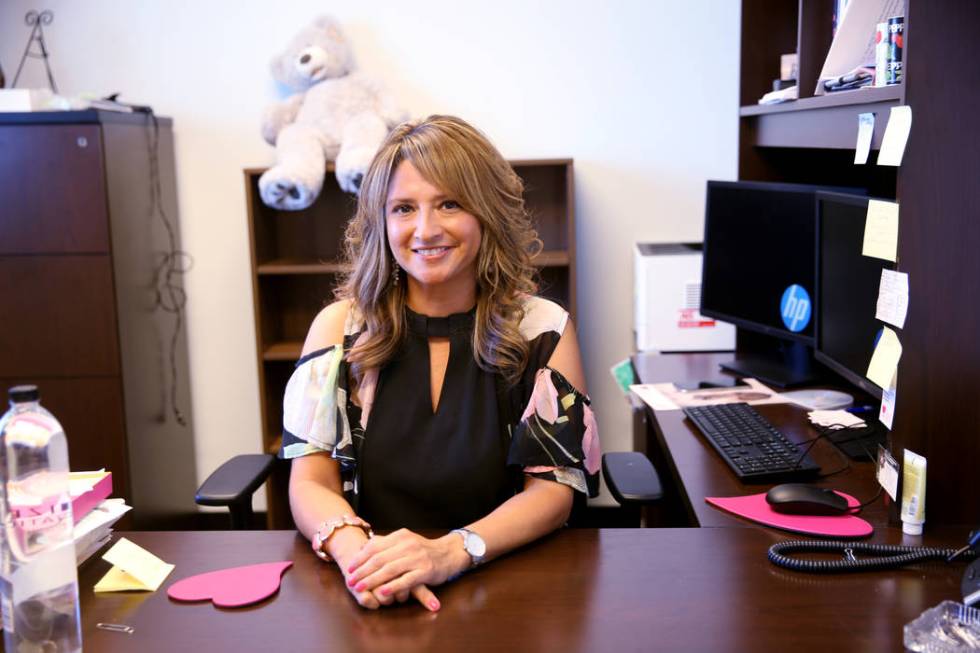New director of Las Vegas’ Shade Tree shelter follows ‘calling’

Vegas Voices is a weekly series highlighting notable Las Vegans.
Linda Perez took a risk when she moved to Las Vegas.
She found plenty of opportunities in the city’s nonprofit sector and decided to see what she could find.
When the executive director position opened up at The Shade Tree, she knew she had made the right decision.
“I feel that this is my calling, my purpose,” Perez says.
She brings extensive experience with nonprofit work, and an even more extensive capacity for compassion, to the role and hopes to increase awareness and resources for vulnerable women and children in Las Vegas.
Perez worked for Caesars Entertainment, opening casinos in the Midwest and making frequent business trips to Las Vegas.
In the past year, she began to fall in love with what she saw outside of the Strip and reached out to nonprofit community leaders.
“I love the work that they’re doing here. In some areas, I had done things that they haven’t done here yet and I felt like there was an opportunity for me to make a difference in the community,” says Perez, who was appointed executive director in June.
As a survivor of domestic violence, Perez says she knows firsthand the challenges facing women and children in unsafe situations. And she feels well-positioned to provide the resources they need to gain safety and independence.
“People don’t know what they don’t know,” she says. “And not having that resource, they feel hopeless when they’re in that situation. They’re drained. Any power they had as a woman is gone. We get to be that resource, to be that difference.”
She recently talked to us about The Shade Tree’s mission and what compels her to help others break the cycle of domestic violence.
Review-Journal: Is your passion for nonprofit work or specifically for women and children who are vulnerable?
Linda Perez: I’m a survivor of domestic violence, so yes, I’m very passionate about this cause. What I realize is, because I partner with so many organizations back at home, and that’s what I’m trying to do here, it’s about giving back to the community. Even though I’m passionate about what I do here, every community is hurting. Every nonprofit that is created, it’s because there is a need.
So I get involved wherever I can. They partner with me to gain awareness for them, then I get to partner with them for our cause. We get to do things together and change the community together. Not one organization can do it by themselves. I find that I’m a giver, I’m about helping others and empowering others, and I find that, in the nonprofit area, I’m allowed to do that.
As a survivor, when you needed resources in your community, did you find that they were available?
This is why I’m so passionate about this work and creating awareness about services that are out there, because I didn’t use services. Here’s the perception of people who are abused: They think it’s one type of person. It’s not. Domestic violence knows no discrimination; it doesn’t know race, religion or economic background. I already had my career. He was studying to be a doctor.
I was not sharing what I was going through, not even with my parents because … you love them. You think they’re going to change. It’s embarrassing. I wasn’t going to bring shame to myself or to him. So I never utilized services. I just dealt with my situation privately and that didn’t work.
I realize as I see my step-daughter and nieces growing up, if I was living that life privately, I wasn’t going to be able to stop the violence in my life or my family’s life, that wasn’t going to serve me. I was given these experiences so I could use my voice.
How were you involved in nonprofit work in Indiana?
I ran a domestic violence shelter as executive director in Indiana. Prior to that, my first step in nonprofit was volunteering at my 15,000-member church. I got involved and that turned into a job. I became director of guest services and utilized my experience in leadership. I started doing more in empowering women, working with young girls. A colleague of mine told me about the executive director position at the domestic violence shelter. This is why I say God works in mysterious ways. I’m a victim of domestic violence, my background is business and leadership, and that really did help me. I know this: It’s what I love.
What is your priority in this position?
Awareness is key. They have to know who you are and what your cause is. I find if you can get into the hearts of people that have a personal connection to what we do — and the statistics are 1 in 4 women, 1 in 7 men — when you think about your circle of family, friends, loved ones, that means either you or someone you know, someone you love has or will be affected by domestic violence. Why wouldn’t you want to be involved? That’s what we try to do is break the cycle.
If someone feels like your story applies to them or they may be in an unsafe situation, where can they start?
By giving us a phone call. Make that first step. People think if they call a shelter that means they’re ready to come in, and that’s not the case. Sometimes we get calls and we encourage people, even if they’re just requesting information and not ready to leave their situation, we can start a dialogue. They can still utilize our resources like connect with a case manager for workforce development. One day they’re ready and they get here and we start our program.
Contact Janna Karel at jkarel@reviewjournal.com or 702-477-3835. Follow @jannainprogress